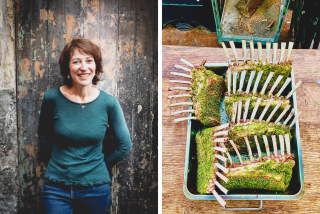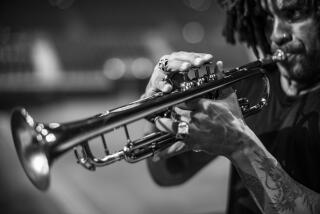In a city of stone, Paris club-goers flock to a bit of nature
As night falls on the gated parks of Paris, guards wearing flat-topped De Gaulle-era caps walk around trimmed, angular shrubbery blowing whistles and rushing visitors out before locking iron gates and putting the parks to a silent night’s rest.
But something different happens in the Buttes Chaumont Park, a large patch of green that looks like a bit of forested wilderness on the steep hills overlooking neighborhoods popular with immigrant families and artists in the northeastern part of town.
No sign points to the small, black-gated entrance on the eastern edge of the sprawling park. But if you happen to stand near the Botzaris Metro stop just after dark, you can’t miss the young passersby. Out of a cab, or the Metro, appearing suddenly from up the street, they’re dressed for a night out in Paris.
Without as much as a glance over the shoulder, they stride up to the darkened park and its spiked gate. Then they disappear.
“Show me your bag, and then you can go to Rosa Bonheur,” says a security guard standing inside the gate.
Your bag proves safe. You’re in.
Past the gate, the smell of wet foliage and soil -- a rare thing in Paris -- takes you that much farther from the city. Yellow-green halos glow around the old iron street lamps lining the path. Peeking through to the right, beyond a sloping grass hill, lies Paris.
Down the path, colorful lights are strung over outdoor picnic tables spread with baguettes, cheeses, bottles of wine and overflowing ashtrays. People mingle over the food, or nearby, where trees break for one of the park’s best views.
You’ve arrived at Rosa Bonheur, a white-and-green-trimmed guinguette -- an open-air cafe or dance hall -- built in 1867.
Inside and past the steamed-up windows, the place is packed by 9 p.m.
People occupy just about every inch in the little tavern. A girl with bangs cut straight across her forehead, bright red lipstick and an a la mode sailor-striped T, her long legs stretched longer in heels, sits on a crowded tabletop eating salted ham out of a plastic container with her fingers.
Couples and groups dance in pockets of space between the crowd, which gets so dense it can be hard to cross. A guy in dreadlocks keeps passing, making friendly conversation with strangers as though he’s known them for years, but he’s clearly not flirting. Another woman belts out the lyrics to an old Edith Piaf favorite, and everyone just keeps dancing.
Coming to Rosa Bonheur is like walking into a really happening Parisian house party. If residents of the French capital don’t particularly like talking to strangers, or dancing spontaneously in bars or any public place that’s not an expensive nightclub, at Rosa Bonheur they let loose.
It could be the way it’s tucked into a pocket of nature, surrounded by a stone-dominated city, or the music that ranges from Frank Sinatra and Piaf to Beyonce and Michael Jackson, or the picnic food in boxes, or the fact that it’s named after a 19th century painter whose last name means “happiness,” but whatever it is, Parisians flock to Rosa Bonheur.
“Parisians have had enough of fancy clubbing. They need red wine, meat and parties,” says Valerie Foucaut, 33, who holds court at a small bar in the back of Rosa Bonheur.
“Parisians can just be so. . . .” She purses her lips, tightens her shoulders and lifts her hands to her ears. “Uptight?”
“It’s not their fault,” she adds with a sigh. “This is a city where you need a lot of money. There’s a lot of social pressure.”
This place “puts them at ease, and it brings out their simple, natural side. So it makes fireworks! Because they can express themselves,” says Foucaut, bouncing a bit in place.
When asked why she wanted to open Rosa Bonheur, Michelle Cassaro laughs.
“What? You some kind of psychiatrist? . . . We’re a team. There are people here with a lot more personality than me. Go ask them,” Cassaro, 46, the house manager, says of the other women and men who joined her to launch the project, which officially opened in the summer of 2008.
Then she quickly leans in with a smile to explain: “I had to find a place connected to the outdoors, because if not, I was going to have to go back to the Midi,” the southern French region where she is from, and that gives Rosa Bonheur its “spirit,” she says.
“I can’t stay closed in. . . . So this is perfect, and it prevents having to get on a train.”
“The Midi parties that we do in villages are like this: Everyone is mixed. The young, the old; the rich, the poor; gay, not gay,” says Cassaro, who used to run a lesbian club in Paris with several of her other friends now at Rosa Bonheur. “It’s really relaxed, it’s natural. . . . We’re keeping house here.”
Foucaut kisses guests or friends -- it’s hard to tell the difference -- as they walk in, holding out her arms as she talks excitedly and pours yet another glass of wine.
“Our south, our nature is here,” she says. “My grandparents were from the countryside. . . . We brought the Parisians toward that. We opened a crack in the door.”
Lauter is a special correspondent.
More to Read
Start your day right
Sign up for Essential California for news, features and recommendations from the L.A. Times and beyond in your inbox six days a week.
You may occasionally receive promotional content from the Los Angeles Times.






